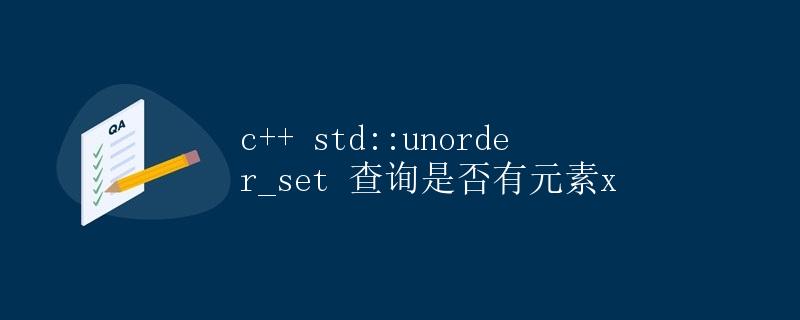C++ std::unordered_set查询是否有元素x

在C++标准库中,std::unordered_set是一个用于存储唯一元素集合的容器。与std::set不同,std::unordered_set不会对元素进行排序,因此在插入和查询方面具有更好的性能。本文将详细介绍如何使用std::unordered_set来查询是否存在特定元素x。
什么是std::unordered_set
std::unordered_set是C++标准库中的一个容器类,用于存储唯一元素的集合。它是基于哈希表实现的,因此插入和查询操作的平均时间复杂度为O(1)。与其他容器不同,std::unordered_set不会对元素进行排序。它是C++11引入的标准库容器之一,定义在<unordered_set>头文件中。
创建std::unordered_set对象
要使用std::unordered_set,首先需要包含<unordered_set>头文件,然后可以使用以下语法创建一个std::unordered_set对象:
#include <unordered_set>
std::unordered_set<int> mySet;
上述代码创建了一个名为mySet的std::unordered_set对象,用于存储整数类型的元素。如果想要存储其他类型的元素,只需将int替换为相应的类型即可。
插入元素
向std::unordered_set中插入元素可以使用insert()函数。以下是插入元素的示例代码:
std::unordered_set<int> mySet;
mySet.insert(10);
mySet.insert(20);
mySet.insert(30);
上述代码将整数10、20和30依次插入到mySet中。
查询元素是否存在
要查询std::unordered_set中是否存在特定元素x,可以使用find()或count()函数。这两个函数都可以用于在std::unordered_set中查找元素,但它们的用法略有不同。
使用find()函数
find()函数返回一个迭代器,指向std::unordered_set中的元素,如果元素不存在,则返回std::unordered_set::end()迭代器。以下是使用find()函数查询元素的示例代码:
std::unordered_set<int> mySet;
mySet.insert(10);
mySet.insert(20);
mySet.insert(30);
std::unordered_set<int>::iterator it = mySet.find(20);
if (it != mySet.end()) {
// 元素20存在
std::cout << "元素20存在" << std::endl;
}
else {
// 元素20不存在
std::cout << "元素20不存在" << std::endl;
}
上述代码通过find()函数查询元素20是否存在于mySet中,并根据查询结果输出相应的信息。
使用count()函数
count()函数返回std::unordered_set中具有给定键的元素的数量。对于std::unordered_set来说,由于每个键在容器中都是唯一的,因此count()函数的返回值要么是0,要么是1。以下是使用count()函数查询元素的示例代码:
std::unordered_set<int> mySet;
mySet.insert(10);
mySet.insert(20);
mySet.insert(30);
if (mySet.count(20) != 0) {
// 元素20存在
std::cout << "元素20存在" << std::endl;
}
else {
// 元素20不存在
std::cout << "元素20不存在" << std::endl;
}
上述代码通过count()函数查询元素20是否存在于mySet中,并根据查询结果输出相应的信息。
完整示例代码
下面是一个完整的示例代码,演示了如何使用std::unordered_set来查询是否存在特定元素x:
#include <iostream>
#include <unordered_set>
int main() {
std::unordered_set<int> mySet;
mySet.insert(10);
mySet.insert(20);
mySet.insert(30);
// 使用find()函数
std::unordered_set<int>::iterator it = mySet.find(20);
if (it != mySet.end()) {
std::cout << "元素20存在" << std::endl;
}
else {
std::cout << "元素20不存在" << std::endl;
}
// 使用count()函数
if (mySet.count(40) != 0) {
std::cout << "元素40存在" << std::endl;
}
else {
std::cout << "元素40不存在" << std::endl;
}
return 0;
}
运行上述代码,输出如下结果:
元素20存在
元素40不存在
总结
本文介绍了如何使用C++标准库中的std::unordered_set来查询是否存在特定元素x。std::unordered_set是一个用于存储唯一元素集合的容器,通过find()和count()函数可实现对元素的查询。使用std::unordered_set可以在O(1)的平均时间复杂度内实现快速的插入和查询操作。
 极客教程
极客教程